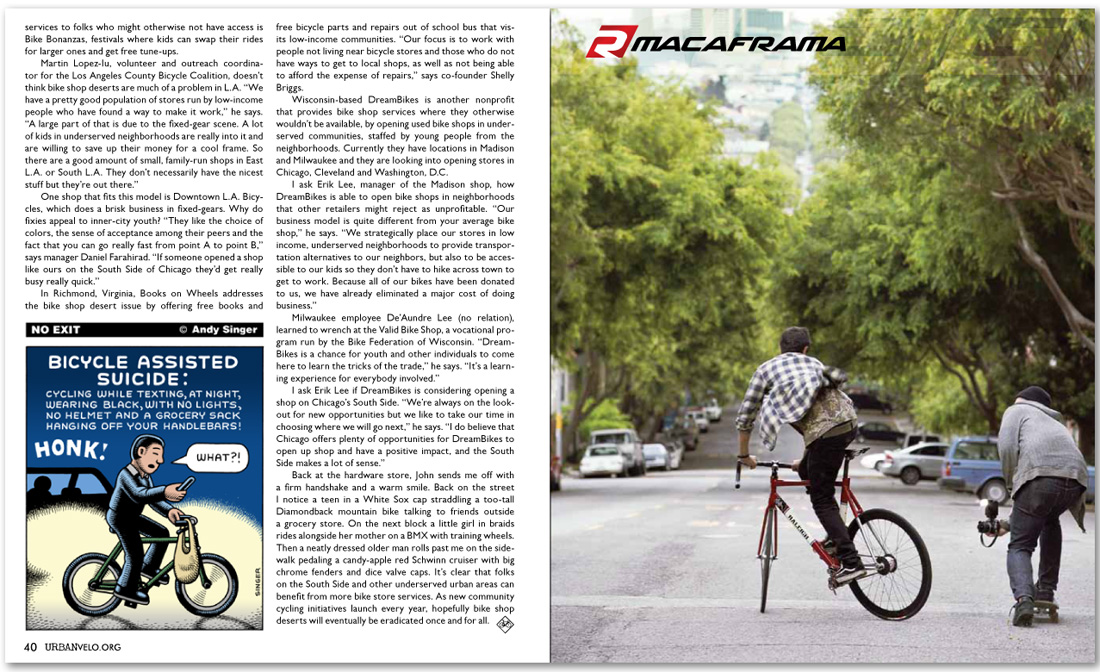


services to folks who might otherwise not have access is Bike Bonanzas, festivals where kids can swap their rides for larger ones and get free tune-ups.
Martin Lopez-Iu, volunteer and outreach coordinator for the Los Angeles County Bicycle Coalition, doesn’t think bike shop deserts are much of a problem in L.A. “We have a pretty good population of stores run by low-income people who have found a way to make it work,” he says. “A large part of that is due to the fixed-gear scene. A lot of kids in underserved neighborhoods are really into it and are willing to save up their money for a cool frame. So there are a good amount of small, family-run shops in East L.A. or South L.A. They don’t necessarily have the nicest stuff but they’re out there.”
One shop that fits this model is Downtown L.A. Bicycles, which does a brisk business in fixed-gears. Why do fixies appeal to inner-city youth? “They like the choice of colors, the sense of acceptance among their peers and the fact that you can go really fast from point A to point B,” says manager Daniel Farahirad. “If someone opened a shop like ours on the South Side of Chicago they’d get really busy really quick.”
In Richmond, Virginia, Books on Wheels addresses the bike shop desert issue by offering free books and free bicycle parts and repairs out of school bus that visits low-income communities. “Our focus is to work with people not living near bicycle stores and those who do not have ways to get to local shops, as well as not being able to afford the expense of repairs,” says co-founder Shelly Briggs.
Wisconsin-based DreamBikes is another nonprofit that provides bike shop services where they otherwise wouldn’t be available, by opening used bike shops in underserved communities, staffed by young people from the neighborhoods. Currently they have locations in Madison and Milwaukee and they are looking into opening stores in Chicago, Cleveland and Washington, D.C.
I ask Erik Lee, manager of the Madison shop, how DreamBikes is able to open bike shops in neighborhoods that other retailers might reject as unprofitable. “Our business model is quite different from your average bike shop,” he says. “We strategically place our stores in low income, underserved neighborhoods to provide transportation alternatives to our neighbors, but also to be accessible to our kids so they don’t have to hike across town to get to work. Because all of our bikes have been donated to us, we have already eliminated a major cost of doing business.”
Milwaukee employee De’Aundre Lee (no relation), learned to wrench at the Valid Bike Shop, a vocational program run by the Bike Federation of Wisconsin. “DreamBikes is a chance for youth and other individuals to come here to learn the tricks of the trade,” he says. “It’s a learning experience for everybody involved.”
I ask Erik Lee if DreamBikes is considering opening a shop on Chicago’s South Side. “We’re always on the lookout for new opportunities but we like to take our time in choosing where we will go next,” he says. “I do believe that Chicago offers plenty of opportunities for DreamBikes to open up shop and have a positive impact, and the South Side makes a lot of sense.”
Back at the hardware store, John sends me off with a firm handshake and a warm smile. Back on the street I notice a teen in a White Sox cap straddling a too-tall Diamondback mountain bike talking to friends outside a grocery store. On the next block a little girl in braids rides alongside her mother on a BMX with training wheels. Then a neatly dressed older man rolls past me on the sidewalk pedaling a candy-apple red Schwinn cruiser with big chrome fenders and dice valve caps. It’s clear that folks on the South Side and other underserved urban areas can benefit from more bike store services. As new community cycling initiatives launch every year, hopefully bike shop deserts will eventually be eradicated once and for all.